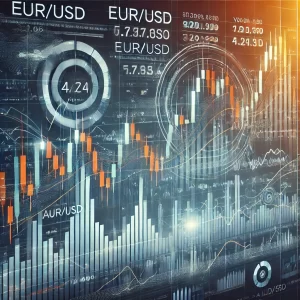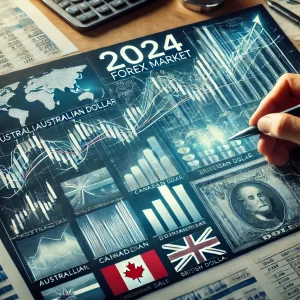Introduction
Forex trading, also known as foreign exchange trading or simply forex, is the global marketplace for buying and selling currencies. Unlike other financial markets, the forex market operates 24 hours a day, five days a week, and is the largest and most liquid market in the world, with trillions of dollars traded daily. This article provides a comprehensive guide to understanding what forex trading is, how it works, and the key factors that influence this dynamic market.
What Is Forex Trading?
Forex trading involves the exchange of one currency for another with the goal of making a profit from fluctuations in currency values. Currencies are traded in pairs, such as the Euro against the US Dollar (EUR/USD) or the British Pound against the Japanese Yen (GBP/JPY). When you trade forex, you are essentially speculating on the direction in which one currency will move relative to another.
For example, if you believe that the Euro will appreciate against the US Dollar, you would buy the EUR/USD pair. Conversely, if you think the Euro will weaken, you would sell the pair. The value of a currency pair is influenced by various factors, including economic indicators, geopolitical events, and market sentiment.
How Does Forex Trading Work?
The forex market operates on an over-the-counter (OTC) basis, meaning there is no central exchange like there is for stocks. Instead, trading takes place electronically via a network of banks, brokers, and financial institutions. This decentralized nature allows for continuous trading across time zones, with the market opening in Sydney and moving through Tokyo, London, and New York. Forex trading can be conducted through different types of orders:
Market Orders: A market order is an instruction to buy or sell a currency pair at the current market price. This is the most straightforward type of order and is executed immediately.
Limit Orders: A limit order is an instruction to buy or sell a currency pair at a specified price or better. This type of order ensures that you do not pay more than your desired price for a trade.
Stop Orders: A stop order is an instruction to buy or sell a currency pair once it reaches a certain price. This is commonly used to limit losses or lock in profits.
Trailing Stops: A trailing stop is a type of stop order that moves with the market price, allowing traders to lock in profits while minimizing losses.
Getting Started With Forex Trading
Getting started with forex trading requires a few key steps:
Choose a Reliable Forex Broker: Your first step is to select a forex broker that offers a trading platform, competitive spreads, and reliable customer support. It’s important to choose a broker that is regulated by a reputable financial authority.
Open a Trading Account: Once you’ve chosen a broker, you’ll need to open a trading account. This typically involves filling out an online application and providing proof of identity and residence.
Fund Your Account: After your account is approved, you’ll need to deposit funds into it. Most brokers offer multiple funding options, including bank transfers, credit cards, and e-wallets.
Learn the Basics: Before you start trading, it’s crucial to educate yourself about the forex market. Many brokers offer educational resources such as webinars, tutorials, and demo accounts where you can practice trading without risking real money.
Develop a Trading Strategy: A successful forex trader needs a well-defined trading strategy. This includes deciding on your trading style (day trading, swing trading, etc.), setting risk management rules, and using technical and fundamental analysis to make informed decisions.
Start Trading: Once you’re comfortable with your knowledge and strategy, you can start trading. Begin with small positions to minimize risk and gradually increase your trading size as you gain experience.
Factors Influencing The Forex Market
The forex market is influenced by a variety of factors, which can cause currency prices to fluctuate. Understanding these factors is crucial for making informed trading decisions:
Economic Indicators: Economic data such as GDP growth, inflation rates, employment figures, and interest rates are key drivers of currency values. For example, if the US Federal Reserve raises interest rates, the US Dollar is likely to appreciate as higher rates attract foreign investment.
Geopolitical Events: Political events, such as elections, trade wars, and conflicts, can have a significant impact on the forex market. For example, political instability in a country can lead to a depreciation of its currency as investors seek safer assets.
Market Sentiment: Market sentiment refers to the overall mood or attitude of traders towards a particular currency. This can be influenced by news reports, economic forecasts, and other factors that affect traders’ perceptions of a currency’s future direction.
Central Bank Policies: Central banks play a crucial role in the forex market by setting monetary policy, including interest rates and money supply. Decisions made by central banks, such as the European Central Bank or the Bank of Japan, can have a profound impact on currency values.
Speculation: A large portion of forex trading is driven by speculation, where traders bet on the future direction of currency prices. Speculators often use leverage to amplify their positions, which can lead to significant price swings in the market.
Risks And Rewards Of Forex Trading
Forex trading offers significant opportunities for profit, but it also comes with risks. The use of leverage, which allows traders to control larger positions with a small amount of capital, can magnify both gains and losses. Additionally, the forex market is highly volatile, with prices sometimes moving rapidly due to unexpected news or events.
To manage risk, it’s important to use tools like stop-loss orders, which automatically close a trade if it reaches a certain level of loss, and to never risk more than you can afford to lose. Successful forex traders are disciplined, patient, and continuously educate themselves about market conditions and trading strategies.
Conclusion
Forex trading is a complex but potentially rewarding activity that requires a solid understanding of the market, a well-thought-out trading strategy, and disciplined risk management. By learning the basics, staying informed about market developments, and practicing your trading skills, you can increase your chances of success in the forex market. Whether you’re looking to trade part-time or pursue forex trading as a full-time career, the knowledge and skills you develop will be key to your success.


